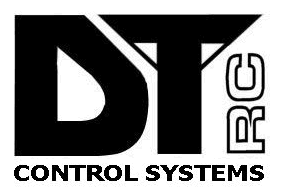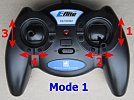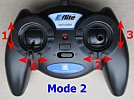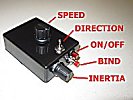

|
Rx62-1 Instructions (v611)
|

|

|

|

|
1. DEFAULT SETUP
|
Item |
Setting | Details |
|
Purpose: |
Rx62-1 |
Train with joystick transmitter |
|
Red wire positive (+) Black wire negative (-) |
Battery |
3-13v Observe polarities |
|
eSwitch |
See below. |
|
|
H1 output Direction |
Motor Ch1 (Throttle) Ch3 (Elevator) |
Integrated forward/reverse ESC for brushed motors Low off (for full stick power control) Move stick in required direction then release Only effective when stopped |
|
P1 |
Front Light |
Auto action, LED2 enabled |
|
P2 |
Rear Light |
Auto action |
|
P3 |
On/Off |
Direction switch (Ch3) On when channel is Low, Momentary action |
|
P4 |
On/Off |
Direction switch (Ch3) On when channel is High, Momentary action |
|
L input |
Auto-detect |
Monitors battery when used with a voltage booster |
|
Arming |
Enabled |
Ch1 to low position (off) |
|
Low Voltage Cutoff |
Enabled |
Led 5-flash if triggered (LVC) |
| Cruise control | Enabled |
Outputs 'hold' last position on signal loss/Tx switched off |
| Inactivity Sleep | Enabled |
Invoked after 1hour, Switch Rx off and on to restart |
| LVC Sleep | Enabled |
Invoked 5 minutes after LVC event, Charge battery |
|
Battery Voltage flashes |
Enabled (from v611-15) |
Press Bind button (Ch5) briefly and count flashes as described here Flashes appear on LED2 output (P1) |
2. eSWITCH
The eSwitch is an integrated electronic on/off switch. It is optional and can be bypassed (see below). The eSwitch requires a reed switch (supplied). This has to be connected to the two 'R' pads. The reed is operated with a magnet (not supplied). Any magnet can be used but the strength required depends on the distance between the magnet and reed.
To switch the receiver ON the magnet must activate the reed switch for any length of time. The led will start working.
To switch the receiver OFF:
1. Press the Bind button (Ch5 low) for more than 5 seconds. The 5s duration can be adjusted from 1-10s.
2. Alternatively, activate the reed switch with a magnet for more than 2 seconds. To reduce false triggering, the receiver will switch itself off 2 seconds after you remove the magnet. The led will stop working and the transmitter will no longer be able to control the model. Try again if it does not work first time.
3. EXAMPLE CONNECTIONS:

|

|

|

pushbutton (R) |

|
The above images are for Rx62a. Connections are the same for Rx62b.
Connect the battery to the '+' and '-' pads to use the eSwitch.
A reed switch or pushbutton must be connected to the two 'R' pads.
The eSwitch can be bypassed by connecting the battery to the 's' and '-' pads.
'P' outputs are either 3.3v or 0v (ground). Leds need resistors to limit current to no more than 20mA. High brightness leds allow a lower current which is preferred (eg: 2-5mA). Google will reveal how to select resistor values but 220-470ohms will be safe starting values.
The 'L' pad is intended to monitor a battery whose voltage is increased with a voltage booster. This should not be used with the eSwitch because the eSwitch does not switch the Booster and 'L' pad circuits off. To use the L pad you should bypass the eSwitch and use an external mechanical switch as illustrated above.
4. BINDING
Bind once:
1. Switch Rx on and wait ~20s until led flickers fast.
2. Switch Tx on in bind mode.
3. Rx led should flash slowly; wait for it to go solid.
Change distance between Tx/Rx if binding does not work.
5. LED:
Led On = perfect reception (real-time indicator).
1 flash = Scanning (~2sec between flashes; no signal or not bound if never stops).
2 flash = Model currently not selected (Selecta).
5 flash = LVC/Brownout (voltage went too low; check battery/motor load).
6. PAPERCLIP CHANGES:
The following changes can be made by simply shorting two pads together (eg: with a paperclip):
1. Perform a 'Hard reset' (factory reset).
2. Change motor control between 'low off' and 'center off'.
3. Enable/disable LVC (eg: when using Nicads, NiHMs, LiFe cells).
4. Enable/disable Selecta.
5. Enable/disable Cruise Control/Failsafe.
'Paperclip' changes
7. PROGRAMMING:
This receiver has many other options that are described on the features page.
These are changed using a technique called 'programming': v611.